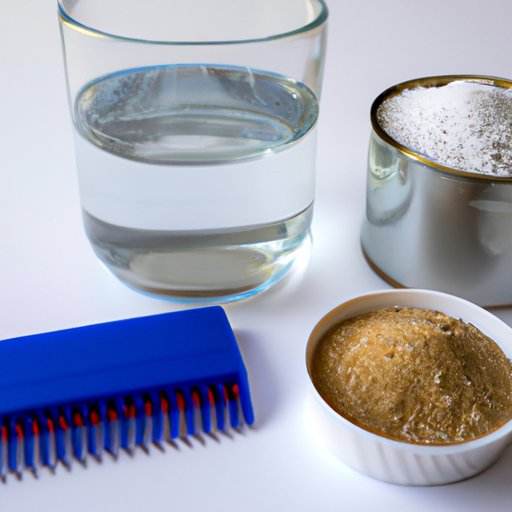Introduction
Hard water is a type of water that contains high levels of minerals such as calcium and magnesium. It can be found in many parts of the world and is often used for drinking, cleaning, and other household tasks. But what does hard water mean for your hair? In this article, we’ll explore the effects of hard water on hair health, examine the relationship between hard water and hair damage, and discuss ways to protect your hair from its adverse effects.

Examining the Effects of Hard Water on Hair Health
The most noticeable effect of hard water on hair is that it makes it difficult to lather shampoo and rinse out conditioner. This can lead to product build-up on the scalp, which can clog pores and lead to dandruff, dryness, and irritation. Hard water also tends to strip away natural oils from the hair, leaving it feeling dry and brittle.
In addition to making it harder to cleanse the hair, hard water can also affect the way your hair care routine works. Many shampoos and conditioners are designed to work best with soft water, so using them with hard water can reduce their effectiveness. For example, a shampoo designed to add moisture to the hair may not work as well when used with hard water.
Finally, hard water can have a negative impact on the overall quality of your hair. The minerals in hard water can deposit on the hair shaft, making it more difficult for the hair to absorb moisture and causing it to look dull and lifeless. These deposits can also cause the hair to become tangled and frizzy, making it harder to manage.

The Relationship Between Hard Water and Hair Damage
While hard water can certainly make your hair look less than its best, it’s important to understand how it can cause actual hair damage. The minerals in hard water can combine with the proteins in the hair shaft, leading to a process called mineralization. This process causes the hair to become brittle and prone to breakage, leading to split ends, thinning, and other types of damage.
It’s also worth noting that different types of minerals can have different effects on the hair. Calcium and magnesium, for example, are known to be particularly damaging to hair, while sodium is much gentler. Knowing the different types of minerals present in your water can help you take steps to protect your hair from damage.
How to Protect Your Hair from Hard Water
If you live in an area with hard water, there are a few steps you can take to protect your hair. The first is to install a water softener, which can remove the minerals from the water and make it much safer for your hair. You can also look for shampoos and conditioners specifically designed for hard water, which can help reduce the effects of the minerals.
Finally, there are several home remedies you can try to reduce the amount of mineral deposits on your hair. Apple cider vinegar, baking soda, and lemon juice are all known to be effective at removing mineral deposits. Simply mix one of these ingredients into a paste and apply it to wet hair, then rinse off after a few minutes.
Conclusion
Living with hard water can certainly be a challenge, especially when it comes to maintaining healthy hair. However, understanding the effects of hard water on hair health and taking the necessary steps to protect your hair can help ensure you maintain beautiful, healthy locks. Installing a water softener, choosing products designed for hard water, and using home remedies to reduce mineral deposits are all great ways to keep your hair looking its best.


